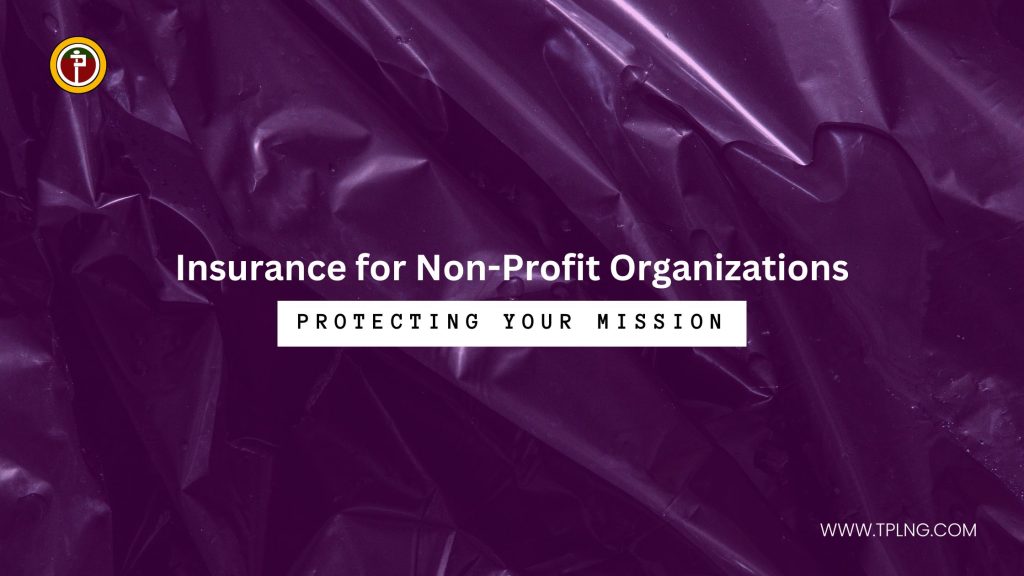Non-profit organizations play a crucial role in society by addressing social, environmental, and cultural issues. While their primary focus is on serving the community, they face unique risks that can jeopardize their mission if not properly managed.
Insurance for non-profit organizations is essential for safeguarding their operations, assets, and the people they serve. This article explores the importance of insurance for non-profits, the types of coverage available, and how to choose the right insurance policies to protect your mission.
Also read Evaluating Insurance Providers: What to Look for in an Insurer
Why Non-Profit Organizations Need Insurance
Non-profits, like any other organization, are exposed to various risks, including property damage, liability claims, employee-related issues, and even cyber threats. Without adequate insurance coverage, these risks could lead to significant financial losses, legal complications, and reputational damage, potentially derailing the organization’s mission.
Here are some key reasons why non-profits need insurance:
- Protection Against Liability: Non-profits can be sued for various reasons, such as accidents at events, allegations of negligence, or claims of discrimination. Liability insurance helps cover legal fees, settlements, and judgments, ensuring that the organization can continue its work without being financially crippled by lawsuits.
- Asset Protection: Non-profits often own property, equipment, and vehicles essential to their operations. Property insurance covers damage or loss due to events like fire, theft, or natural disasters, allowing the organization to recover and resume its activities quickly.
- Employee and Volunteer Protection: Non-profits rely heavily on employees and volunteers. Workers’ compensation insurance provides coverage for work-related injuries or illnesses, while volunteer liability insurance protects the organization if a volunteer is injured or causes harm to others during their service.
- Cybersecurity: With the increasing reliance on technology, non-profits are also vulnerable to cyberattacks and data breaches. Cyber liability insurance helps cover the costs associated with responding to a cyber incident, including legal fees, notification costs, and public relations efforts.
- Compliance with Legal Requirements: Some insurance policies may be legally required, depending on the jurisdiction and the nature of the non-profit’s activities. For example, workers’ compensation is often mandatory for organizations with employees, and certain types of liability coverage may be required for specific types of programs or events.
Also read Understanding Cyber Insurance: Protecting Your Business from Digital Threats
Types of Insurance Coverage for Non-Profit Organizations
Understanding the different types of insurance coverage available is crucial for nonprofits to adequately protect themselves against potential risks. Here are some of the most common types of insurance policies that non-profits should consider:
- General Liability Insurance: This provides coverage for claims of bodily injury, property damage, and personal injury that occur on the non-profit’s premises or as a result of its activities. It is essential for protecting the organization from costly lawsuits and settlements.
- Directors and Officers (D&O) Insurance: D&O insurance covers the personal liability of board members, officers, and directors if they are sued for wrongful acts, errors, or omissions in their managerial roles. This coverage is crucial for attracting and retaining qualified leadership, as it protects them from personal financial loss.
- Property Insurance: This policy covers the physical assets of the non-profit, including buildings, equipment, and inventory. Property insurance is vital for organizations that own or lease property, ensuring they can recover from damage or loss caused by fire, theft, or natural disasters.
- Professional Liability Insurance: Also known as errors and omissions (E&O) insurance, this policy covers claims arising from professional services provided by the non-profit.
- Workers’ Compensation Insurance: This policy provides coverage for employees who suffer work-related injuries or illnesses. It covers medical expenses, lost wages, and rehabilitation costs.
- Volunteer Liability Insurance: Since non-profits often rely on volunteers, this insurance protects the organization if a volunteer is injured or causes harm to others while performing their duties. It can also provide coverage for volunteers themselves if they are injured during their service.
- Automobile Insurance: Automobile insurance is essential if the non-profit owns or uses vehicles for its operations. This coverage protects against liability for accidents, as well as damage to the organization’s vehicles.
- Cyber Liability Insurance: With the growing threat of cyberattacks, cyber liability insurance has become increasingly important. This policy covers the costs associated with data breaches, including legal fees, notification expenses, and the cost of restoring lost or damaged data.
Also read Understanding Insurable Interest in Nigerian Insurance
How to Choose the Right Insurance for Your Non-Profit
Selecting the right insurance coverage for a non-profit organization can be a complex process. Here are some steps to help ensure your organization is adequately protected:
- Assess Your Risks: Conduct a thorough risk assessment to identify the specific risks your organization faces.
- Consult with an Insurance Professional: Work with an insurance broker or agent who specializes in non-profit organizations.
- Review Your Policies Regularly: Regularly review your insurance policies to ensure they still provide adequate coverage and make adjustments as necessary.
- Consider Bundling Policies: Some insurers offer package policies designed specifically for non-profits. Bundling different types of coverage into a single policy can often result in cost savings and simplify the management of your insurance program.
- Budget for Insurance: While insurance is an expense, it’s a necessary one for protecting your organization’s mission. Make sure to include insurance costs in your annual budget and plan for any premium increases over time.
- Educate Your Board and Staff: Ensure that your board members, staff, and volunteers understand the importance of insurance and the specific coverage your organization has in place. This knowledge will help them make informed decisions and reduce the risk of uninsured losses.
In conclusion, insurance is crucial for non-profit organizations in Nigeria, enabling them to protect their mission, assets, and reputation. By understanding their unique risks and securing appropriate insurance coverage, NPOs can maintain financial stability, build trust, and continue making a positive impact. Transparent Protection Ltd is committed to supporting NPOs in Nigeria by providing expert insurance guidance and solutions.
Take advantage of the next article, subscribe now!
Have questions about claim settlements or need assistance with your insurance policy? Our team is here to help! Reach out to us via email at info@tplng.com or give us a call at 0905-776-6182. We’re committed to ensuring genuine claim settlements and supporting our valued members.
TPL, your satisfaction is our priority.




